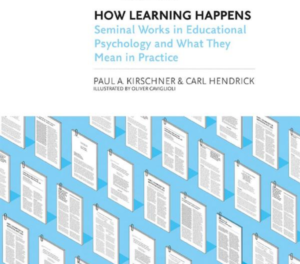Bridging the research-practice divide is a perennial issue in education. Fortunately, Paul A. Kirschner and Carl Hendrick’s book— How Learning Happens: Seminal Works in Educational Psychology and What They Mean in Practice  — helps address this issue by presenting time-tested, impactful research in a way that is useful for educators. Kirschner, Emeritus Professor of Educational Psychology at the Open University of the Netherlands, and Hendrick, who teaches at Wellington College, explain the significance of several seminal studies, engage readers with stories and insightful commentary, explicate applications of research for teaching practice, and provide helpful definitions of research terms and lists of resources for further reading. Kirschner and Hendrick define learning as a change in long-term memory. They discuss implications of how the mind works for supporting learning, the impact of socio-cultural factors on learning, and effective and ineffective teaching and learning practices. They conclude with commentary about common myths about learning and education. This book is a useful primer for teachers in training and individuals new to educational psychology research who seek to bring an evidence base to efforts to improve learning.
— helps address this issue by presenting time-tested, impactful research in a way that is useful for educators. Kirschner, Emeritus Professor of Educational Psychology at the Open University of the Netherlands, and Hendrick, who teaches at Wellington College, explain the significance of several seminal studies, engage readers with stories and insightful commentary, explicate applications of research for teaching practice, and provide helpful definitions of research terms and lists of resources for further reading. Kirschner and Hendrick define learning as a change in long-term memory. They discuss implications of how the mind works for supporting learning, the impact of socio-cultural factors on learning, and effective and ineffective teaching and learning practices. They conclude with commentary about common myths about learning and education. This book is a useful primer for teachers in training and individuals new to educational psychology research who seek to bring an evidence base to efforts to improve learning.
Kirschner and Hendrick first explore aspects of how the mind works. They explain, for example, that experts think qualitatively differently than novices and exert less mental effort to do a task. They present research showing that, although it may feel counter-intuitive, deep and effortful processing is conducive to learning and retaining information. They review several factors that facilitate learning. For example, what one knows already about a topic or skill shapes the extent to which and ways in which they will learn more about that topic or skill. Self-regulation, feelings of efficacy around learning, practice, and metacognition (i.e., thinking about one’s own thinking) all play a role in how people learn. Kirschner and Hendrick offer an overview of the research on “mindsets,” i.e., how beliefs about intelligence and other skills affect performance, and relatedly, the meaning individuals make of experiences of success or failure. They also suggest effective study techniques and how to use them.
In addition to ending each chapter with clear and useful bullet-point descriptions of applications of this research for classroom practices, Kirschner and Hendrick devote a section of the book to research specifically about teaching and tutoring. They discuss the importance of structured support for optimally supporting learning. Good teachers ask questions, check for understanding, and correct students’ misconceptions as they arise. They gradually introduce new and increasingly complex information, provide conceptual models, and offer examples. Good teachers are experts at providing useful feedback. They recognize that assessments are not just for measuring what students know, but also can be useful for expanding what students know and can do.
In addition to advocating for the benefits of direct instruction and showing the evidence base for the efficacy of doing so, Kirschner and Hendrick acknowledge that, as social beings, we learn by observing others in context. In this way, apprenticeships can be a useful way for individuals to learn. Educators should attend to the way our social environments affect how and what we learn.
Unfortunately, many misconceptions prevail about how people learn and about what students would benefit from learning. Kirschner and Hendrick review the extensive research that has accumulated showing that students do not have distinct “learning styles.” Although it is important to be sensitive to individual differences that exist across students, it is also the case that nearly all students benefit from learning across multiple modalities. Another misconception that exists is that in the age of Google, when information is so easily at our fingertips, it is not important for students to learn content knowledge. This is not so; students need content knowledge to help them build increasingly sophisticated understandings of issues, and they need to be taught how to search for reliable sources of information online and sift through evidence.
Readers of How Learning Happens will not only gain insights into the learning process itself, but also will understand the empirical basis for those insights and develop the language and skills necessary for using research to inform an understanding of how learning happens and how best to support it.
Kirschner, P. A., & Hendrick, C. (2020). How Learning Happens: Seminal Works in Educational Psychology and what They Mean in Practice. Routledge.




thank you very nice website article